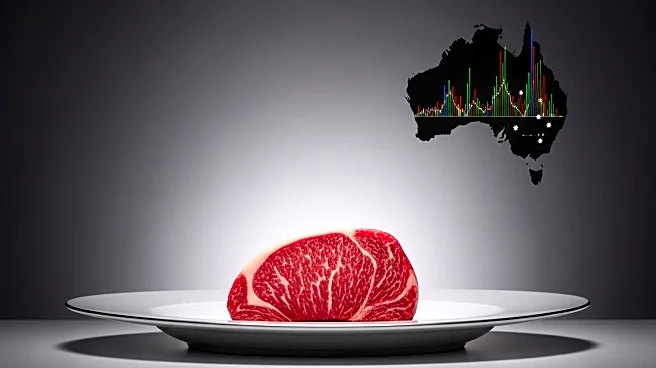What is the story about?
What's Happening?
The U.S. beef industry is experiencing a significant decline in exports to China, largely due to drought conditions that have reduced the cattle herd and increased prices. This situation has allowed Australia to step in and replace U.S. beef supply in China, with Australian beef exports to China increasing substantially. The value of U.S. beef exports to China fell dramatically from $118 million in July 2024 to $8.1 million in July 2025. Similarly, August figures dropped from $125 million to $9.5 million. This shift is attributed to expired permits at American meat facilities and a tariff war initiated by President Trump. Australia has capitalized on this opportunity, increasing its beef shipments to China from $140 million to $221 million in July and $226 million in August.
Why It's Important?
The decline in U.S. beef exports to China has significant implications for the U.S. cattle industry, which is losing a lucrative market. This shift not only affects U.S. beef producers but also impacts the broader agricultural trade dynamics between the U.S. and China. The loss of market share to Australia highlights the competitive pressures faced by U.S. beef producers, who are struggling with high production costs and reduced herd sizes. The situation underscores the importance of trade negotiations between the U.S. and China, as resolving broader trade issues could potentially restore U.S. access to the Chinese market.
What's Next?
Trade negotiations between Beijing and Washington could potentially resolve the current impasse, allowing U.S. beef exports to regain access to the Chinese market. However, even with a trade agreement, the U.S. may struggle to reclaim its market share due to Australia's competitive pricing and increased production. Additionally, an ongoing investigation by China into beef imports could result in further trade curbs, affecting all beef suppliers to China.
Beyond the Headlines
The shift in beef trade dynamics may have long-term implications for global beef trade flows, as countries like Brazil also increase their exports to China. The situation highlights the interconnectedness of global agricultural markets and the impact of geopolitical tensions on trade relationships.















